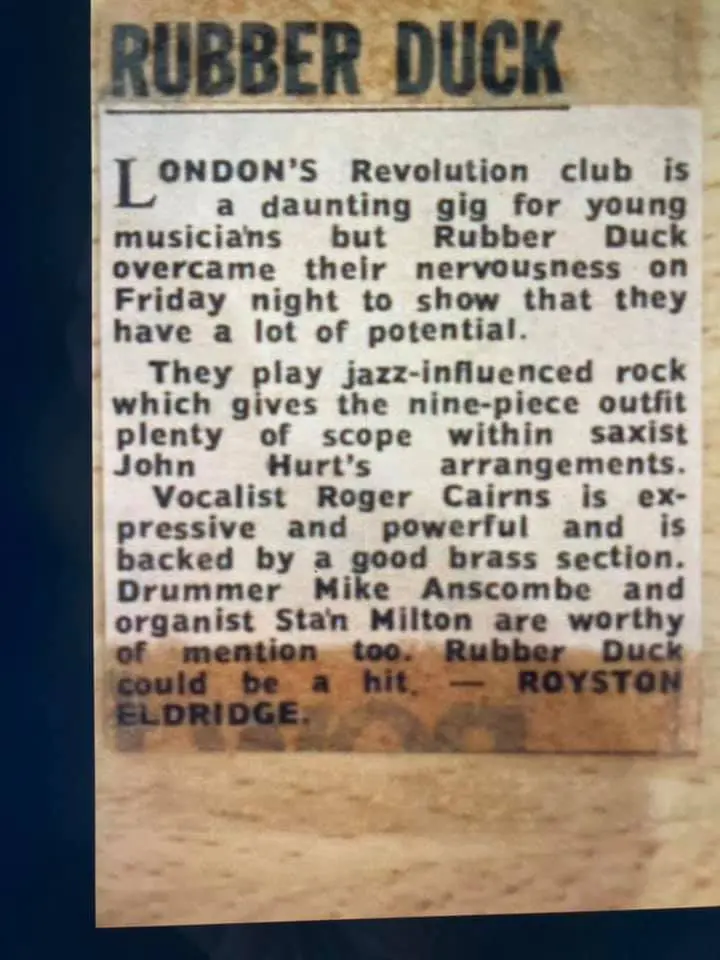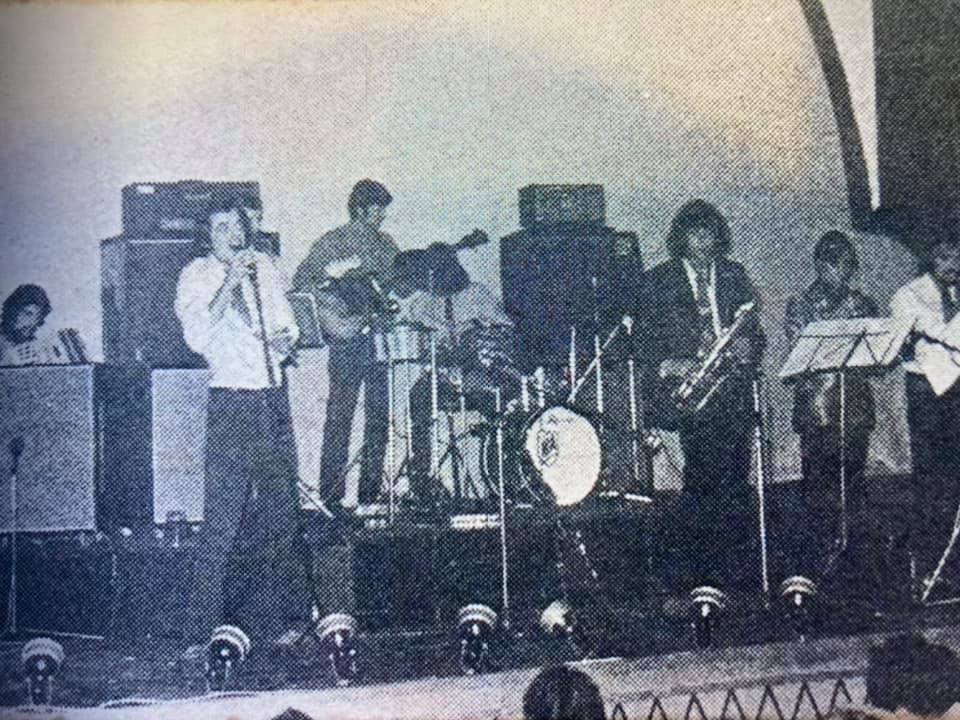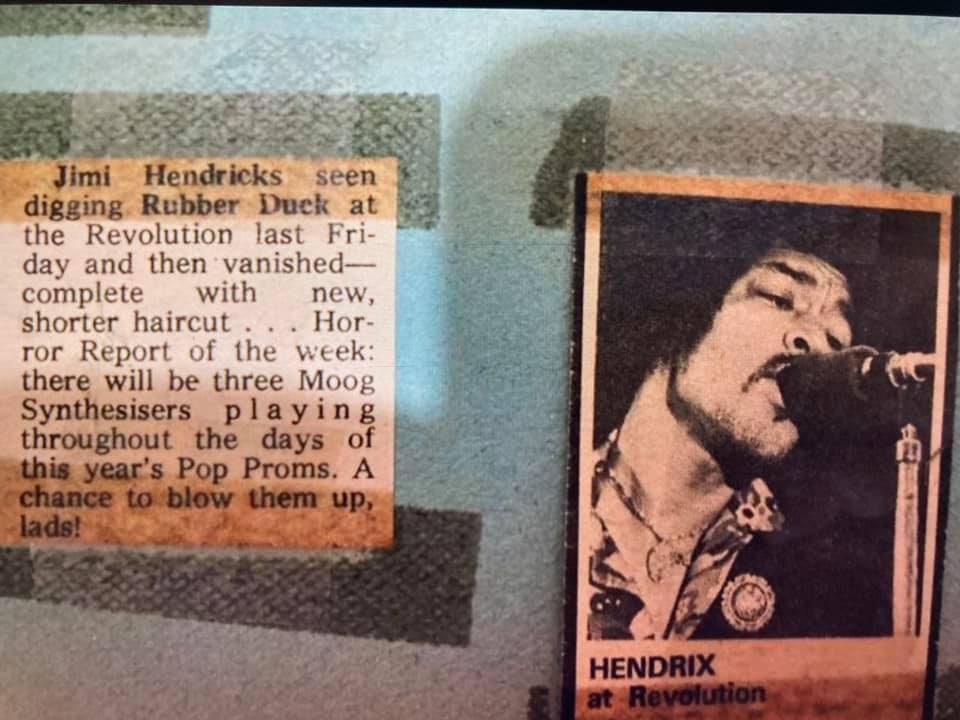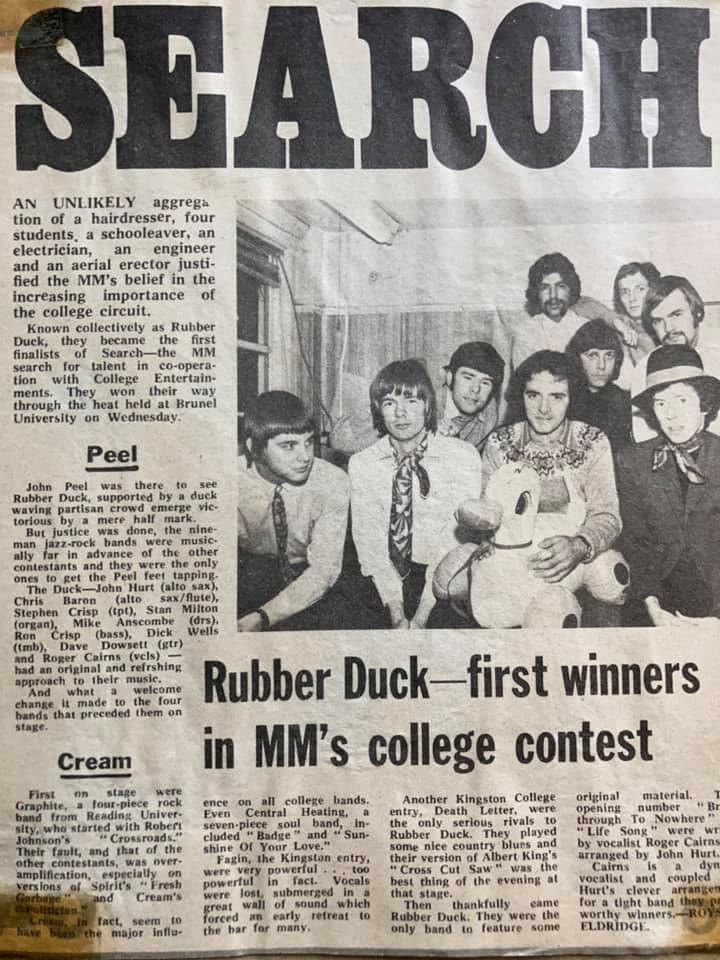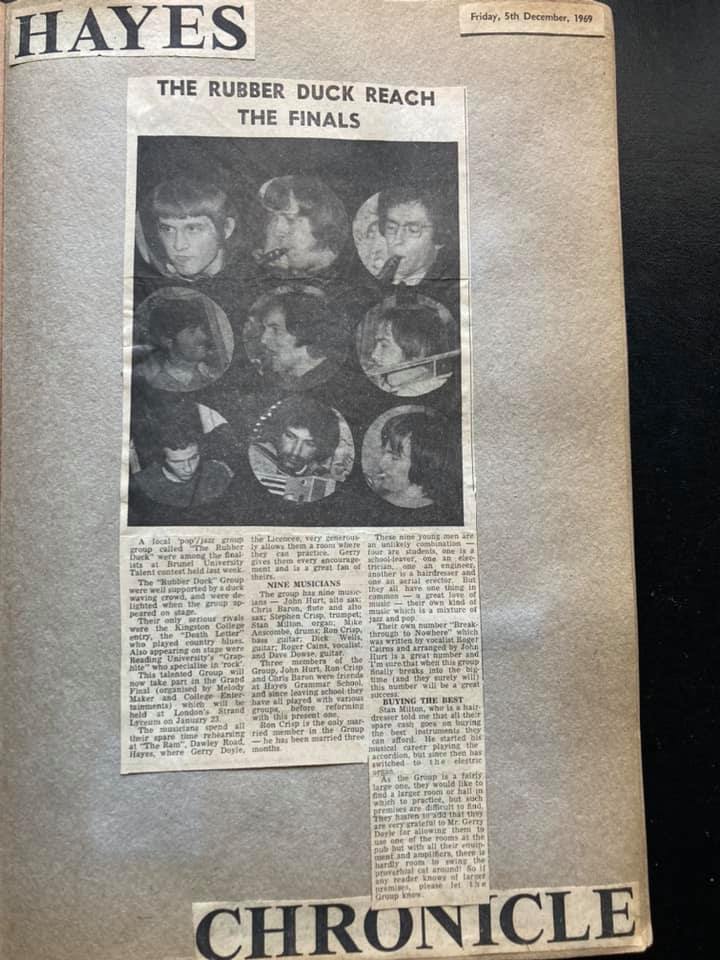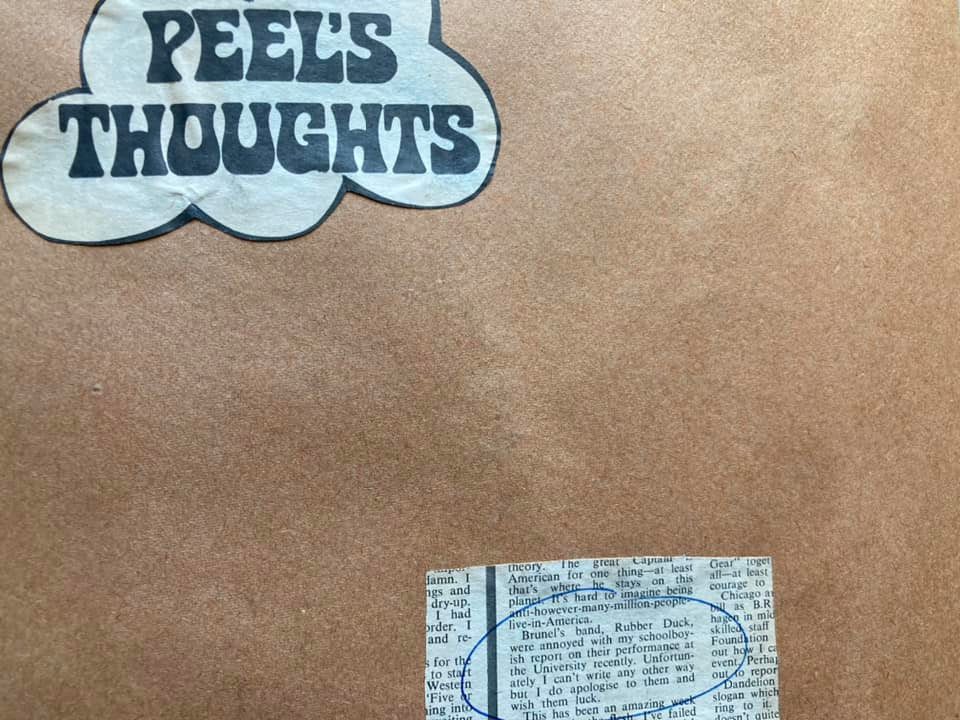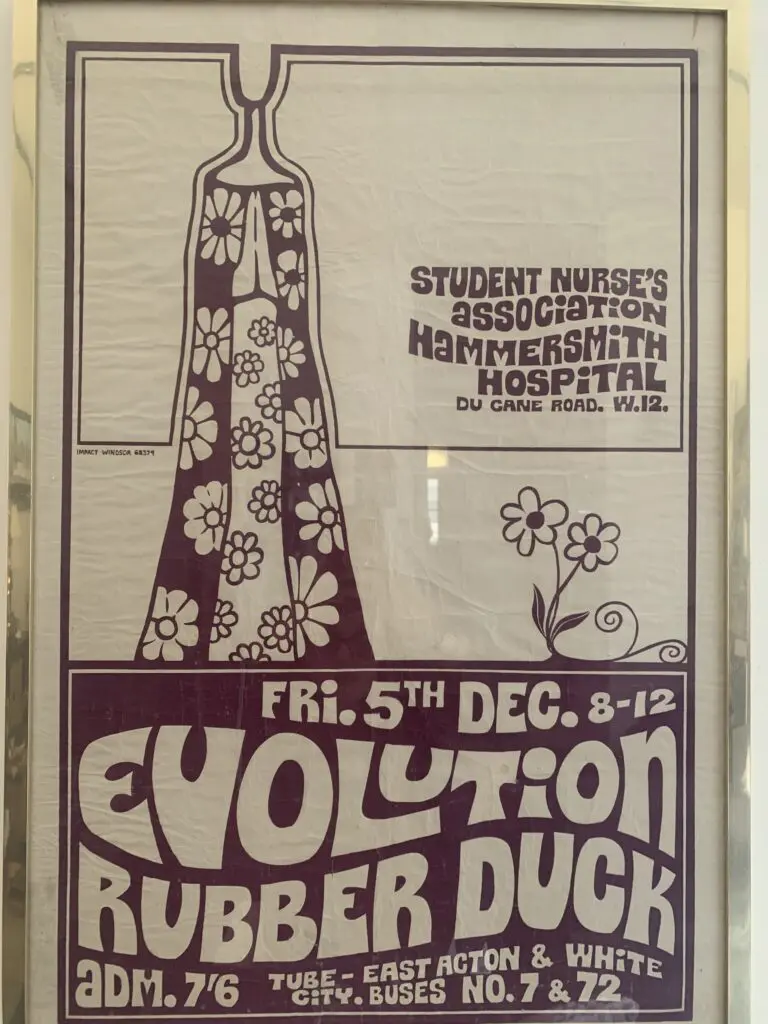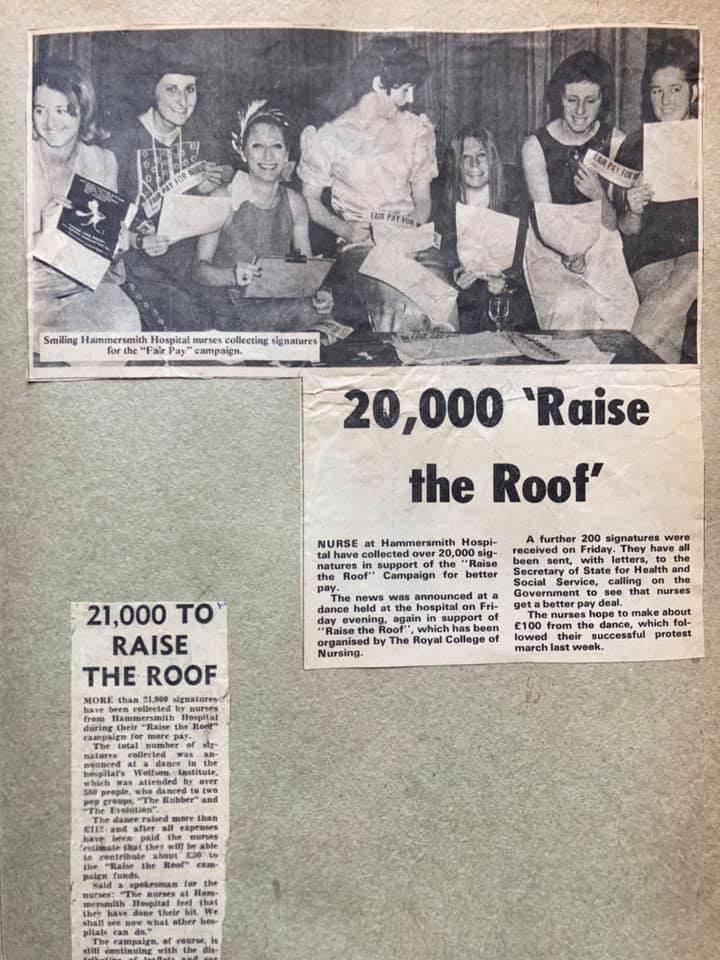Out of the Camp Ch. 7 – Rubber Duck
I hadn’t of course forgotten about music while running all over London risking my neck climbing on roofs. I’d been showing up in rehearsal rooms, pubs, apartments, whatever, to audition for all kinds of groups and bands, had been rejected by most and had walked out of a couple of places without opening my mouth. You wouldn’t believe how bad some of these outfits could be sometimes; I’m sure they weren’t hearing what I was hearing. Well, anyway, I apparently eventually found myself in a West London pub one night together with the tenor and alto sax players of a 9-piece jazz-rock band. I must again confess that I’m relying on the wobbly memories of other folks for many of these recollections because, as usual, I’m blanking out. Chris Baron, the aforementioned alto player assures (?) me of this because he recalls all three of us putting our pints down on the same side of a very unstable table resulting in, guess what? The floor receiving a thorough beer-wash and the landlord mourning the demise of three perfectly serviceable stoups. The capsized table wasn’t having a good day either.
Our first rehearsals were held in a church or church hall in Putney and I don’t remember much about them except that there were one or two personnel changes that were to take place before we started gigging. There was a keyboard player called Bob who didn’t last long and was replaced by an electronic accordion player called Stan, who was a hairdresser from Hayes and when I first heard he was coming, I was thinking, “What? Are we gonnie be throwing in some ‘electric’ Jimmy Shand numbers now? I’m nae fur that.” Well, actually he was able to make some pretty decent sounds come out of that thing, and it worked pretty well for a while, but everyone’s wish was for an organist with a Hammond B3 to show up but they weren’t exactly busting our door down so we settled for the squeezebox.
But my main focus was the drummer. I thought, “Jees! What’s he doing here?” He was awful and had to go. I’m not sure that I revealed my feelings to the rest of the guys at first, instead deciding to ‘keep my powder dry for a while’ and stay shtume. I was always hyper critical of drummers, I think because I’d started out on drums, following my stint in the Boys’ Brigade in Edinburgh, playing side drum in the company pipe band before moving onto a kit. I’d been taught by the then Drum Major of the Edinburgh Police Pipe Band who was emphatic that we mastered the rudiments and insisted that we held the sticks properly. Even years after I’d stopped playing, I retained the knowledge I no longer had the ability to actually play and consequently had a very low tolerance of poor, or worse, zero technique. I eventually started complaining about this fella’s playing which by this time I felt the guys didn’t need me to point out, and after some time I had an idea. I’d actually auditioned for a band a couple of months or so earlier and hadn’t got that job. They had the usual rhythm section line-up with a small horn section, but I particularly remembered being blown away by the drummer, and so was anxious that the guys see him to understand the point I was trying to make. I remember dragging some of them to the other band’s rehearsal and when they saw him in action, I didn’t really need to say another word. I don’t remember what I told the other band leader, but in any event, he agreed to us coming to the rehearsal to hear them, and I don’t remember precisely how it all came together, but my objective was accomplished, and we got ourselves a new drummer, THAT drummer, Mike Anscombe.
We continued rehearsals and at some point, moved to ‘The Ram’ pub in Dawley Road, Hayes, where we remained for some months regularly rehearsing before we even started looking for gigs. Chris’, little (in those days!) sister, Andie, our biggest fan, recalls the new drummer, Mike, showing up one night wearing rubber gloves to set-up his drum kit, presumably to avoid getting his fingerprints on the polished chrome, and the pub’s boxer dog came in, cocked his leg, and ‘christened’ the kit! No recollection of Mike’s response, but Gerry Doyle, the landlord, had a good laugh about it. Actually, I think he was our second biggest fan, a rough diamond from Ireland with a heart of gold, he put up with all sorts of our shenanigans with good humour. One of our earliest gigs was somewhere in the West Country near Chepstow, but no one can quite recall the venue. While we were doing a sound check, Chris, the tenor player remembers Mike asking him to “bash around on his drums while he went to the back of the hall to listen.” Apparently, the support band thought Chris was the drummer and were having a good laugh at his efforts. They were expecting a train wreck when the rest of us finally went on. Too bad! The band’s line up at this point was: John Hurt, alto sax/arranger; Chris Baron, alto sax/flute; Stephen Crisp, trumpet; Dick Wells, trombone; Dave Dowse, guitar; Stan Milton, accordion; Ron Crisp, bass; Mike Anscombe, drums and me singing.
We did other college/university work, but no one remembers where or when, or even if they were there…, or how much we got, for that matter. At least its harder to pin anything on us when nothing is written down. D’you think I should be writing this? Anyway, we were getting busy playing West End clubs such as Blaises, the Bag o’ Nails, Revolution and the Scotch of St. James. One of the agencies that gave us work was College Entertainments, and John Tobin one of the owners there told us about a competition that they were going to be organizing with the Melody Maker newspaper, the UK music business ‘bible’ at the time. The contest, to be called ‘Search’ in which various colleges and universities would nominate a group to represent them and, following completion of heats held in institutions throughout the country, would culminate in a final to be held in London’s Strand Lyceum.
Ultimately, seventy-two groups entered the contest, with the first heat being held at Brunel University in Uxbridge and, as we had developed a following there due to our performances, we were nominated to represent Brunel in the competition, and so we were delighted when we won the Brunel heat. Meanwhile, other heats were being held on college and university campuses nationwide. Our second appearance was at Greenford Town Hall a few weeks later and, this time, we were last to go on and the other competitors were for the most part, rock and heavy metal bands. We started out with our signature number, ‘Breakthrough to Nowhere’, – can you tell we were barely out of the 60s? – and it started well enough but as we progressed, I was becoming more and more distracted by increasingly loud feedback ultimately reaching a deafening crescendo, at which point I decided that this had to stop. I turned and waved the band to a halt and saw the look of horror on their faces. Turning again, I faced the sound engineer who was located at a table a few feet from the front of the stage, and it took him a few seconds to silence the noise. With that, and I’m paraphrasing here, I asked him, on mike, how anyone could be expected to judge our music if they couldn’t hear it. And at that, I was relieved and gratified to receive a round of applause from the audience which I’d noticed, in the balcony, included Chris Welch, a journalist from Melody Maker who was also applauding. I felt emboldened by this and after a minute or two we restarted and mercifully, our set went without a hitch. We won the heat and ultimately went on to appear at the contest final in the Lyceum on January 23, 1970, of which, more later.
A couple of months earlier we had been approached about a gig at Hammersmith Hospital, White City, close to where the BBC Television Centre used to be. At the time there was a national campaign underway on behalf of nurses who, it was generally agreed, were grossly underpaid. The Hammersmith nurses were very active in the National “Raise the Roof”, ‘fair pay for nurses’ campaign, and had organized a protest march where a hospital bed containing a dummy patient had been pushed along the Uxbridge Road in Shepherds Bush. As the march progressed, there were dozens of nurses and volunteers on the pavements on either side of the street collecting signatures, supporting nurses in their demands for fair pay. TV cameras were also present and there was wide coverage of the event on the day’s evening news; there also were similar events taking place at other hospitals across the country. The culmination of the Hammersmith effort was a fundraiser dance held at the Wolfson Education Centre, part of the hospital complex and we were hired to play in addition to another group called Evolution.
I don’t remember where or exactly when I got it, but I was driving an old Dormobile van around at this time and was ‘doubling’ as the band’s roadie. This night, December 5, 1969 was to become a date I’d remember for the rest of my life, not, I hasten to add, because it was the best gig in the history of jazz fusion although it wasn’t too shabby as performances go, a view that doubtless the rest of the chaps would be happy to sanction. No, it was something else. I knew where the hospital was and got there in good time but, as I wasn’t familiar with the campus, I wanted to give myself time to locate the Wolfson Centre. In the event I had no difficulty and found myself hanging around in the hall waiting for someone to arrive and tell me where the equipment was to be set up. After a little while two medical students who were involved in the event showed up and, it turned out, were as clueless as I was about arrangements. We hung around for a while making small talk when suddenly this girl arrived and immediately took charge.
By this time the band were starting to show up, along with other hospital employees involved in the event. Things began to come together as more hospital staff turned up, and what became apparent after a short time was the degree to which everyone referred to Mary, or new arrivals were looking for Mary. Mary was the girl who’d arrived earlier, and it turned out, appeared to be running the show with the assistance of the two young medical students I’d been chatting with. As more and more people started arriving and security measures were put into place at the door, the other band, Evolution, began tuning up and before long were playing to a packed hall of jumping and gyrating twenty-somethings. As we were listening to the group and watching the antics on the dancefloor, Mary came over and started chatting about this and that, I don’t remember exactly what, then drifted off again having observed some oversight or other unattended issue that demanded her attention. We found the bar and spent some time there until the other group finished their set. We headed towards the stage when the music had stopped, and Mary was there at the stage to meet us and check that we had all we needed. I asked if she was getting paid for this, and she just laughed, “Comes with the territory!” she said. I asked what territory that was, and it turned out she was the local secretary of the Hammersmith Student Nurses’ Association and so had got stuck with organizing the dance.
When the others had cleared the stage, we went on and performed our set, and I don’t remember anything extraordinary happening, apart from all the increasingly torturous and eye-watering contortions taking place on the dance floor. All-in-all everyone appeared to have enjoyed themselves and seemed pleased with our performance. We packed up our gear and stood around chatting outside for a while before splitting up and going our separate ways. Mary came over as the others were leaving and said she had a couple of things to do at the hospital so wouldn’t be leaving for a while. I offered her a ride over to the main building which she accepted and, assuming she was living in the student nurses’ quarters there, I was about to take my leave when she asked if I’d take her home. It turned out she was living in a nurses’ hostel, off campus on Holland Road, about 15 minutes from the hospital. Without going into too much detail and anyway, I think I may have dragged this out long enough, suffice to say we were married about 18 months later. We kept the large poster advertising the dance and depicting the day we met, December 5, 1969, had it framed, and from then on it was always on display in homes wherever we lived.
January 23, 1970 and the final of the Melody Maker ‘Search’ Contest arrived. We were as ready as we’d ever be, we hadn’t done much in the way of gigging since the nurses’ dance but had put in a lot of hours of practice in preparation for the big night. The problem now is I can’t remember a damn thing about it! I’ve canvassed the other former band members, but they’ve all drawn a blank despite all the insults and threats I could muster. The most popular solution that they could come up with – and this was unanimous! – was that I make it up. But I can’t do that to you dear reader after you’ve slogged through all of this drivel so faithfully, it wouldn’t be right, now would it? So, the quicker I wind up this sorry saga, the better. Wouldn’t you say? What I do know is that Mary was most certainly there, together with Andie – number one fan – and her “duck-waving partisan crowd’, nonetheless, the truth is we didn’t win. Well, we didn’t win the contest, but I won, didn’t I? I mean, I won a whole lot more than a silly talent contest, right? Damn right!
So anyway, it was back to the Ram and our regular rehearsal routine. Stan our organist/ accordionist had brought a friend of his to a rehearsal a few weeks earlier, and he had turned up again saying a lot of nice things about our music. Not wishing to appear cocky, but we were often getting compliments about our music and didn’t think much about it. What was remarkable about this guy was that he appeared to own a collection of white, antique Rolls Royces in impeccable condition and as the weeks wore on and we were getting to know him quite well, he became a regular visitor, showing up in a different one every week. Sitting in the pub one evening after rehearsal having a drink, he revealed that he was Robert Stigwood’s personal assistant and had been the Bee Gees road manager for years. One of the perks of his job was to drive each of Mr. Stigwood’s cars from time to time – he didn’t say how many there were – in order to keep them running well. He’d asked Stan not to reveal to us who he was as he’d wanted to hear us playing and observe us in our relaxed, “natural habitat” without our feeling that we had to act in any particular way to impress him. He said that he was going to ask Robert Stigwood to come to our next gig at the Revolution and that he’d like us to rehearse and perform a particular song at the gig. The song was called ‘Silly Girl’ and, actually it was a pretty silly song and certainly not one of the better ones written by The Young Rascals who’d recorded it. We ran through it at the next rehearsal, but I honestly can’t remember if we performed it on the day or not. Actually, we did some rehearsing at the Revolution basement that week, and one day when Cream were setting up to play in the club that evening, Ginger Baker had passed Andie, our faithful number one fan and made an “inappropriate comment” (her words!). Digressing again! Stan’s friend’s name, by the way, was Dick Ashby and he was as good as his word and indeed came to our next Revolution performance with his boss, Robert Stigwood. Nothing ever came of it and we didn’t get much in the way of feedback from Dick other than to say that Mr. Stigwood had enjoyed the music but didn’t feel that it was commercial.
A few weeks later on March 21, we were back at the Revolution again and who walks in just as we’d started our second set but Jimi Hendrix. He walked across the dancefloor to a table in the corner just a few feet from the stage and sat there alone for the duration of our set. When we’d finished for the evening he got up, walked over and joined us on the stage and told us how much he’d enjoyed the music. He hung around for several minutes talking about our genre of music, making references to Blood, Sweat & Tears, Don Ellis and of course Miles Davis. He talked about the London scene and how much he enjoyed it. I actually think he liked it better than the scene in New York at the time. All the while we were talking, we continued packing up our gear and chiming in on the conversation from time to time. It didn’t really seem like a huge deal because in London back then we’d regularly run into other artists at agencies, record company offices, clubs or late-night restaurants. Of course, we’d no way of knowing that six months later, on September 18th, he’d be gone.
Images.
(1) Rubber Duck clip from the Melody Maker by journalist, Royston Eldridge. (2) This is a college gig, not sure where. L-R: Stan Milton, keyboard; me-voc; Ron Crisp, bass; Mike Anscombe, drums; John Hurt, tenor sax; Keith Maynard, trumpet; Dick Wells, trombone; (Steve Crisp; trumpet; Chris Baron, Alto Sax & Dave Dowse, guitar out of picture.) (3) Another clip from Melody Maker about our Revolution gig where we met Jimi Hendricks who told us that he enjoyed our music. (4) MM Article about our victory in the ‘SEARCH’ contest heat, held at Brunel University, Uxbridge. (5) Article from the Hayes Chronicle dated December 5, 1969. (6) Clip from John Peel’s, ‘Peels Thoughts’ in the Melody Maker. (7) Poster for the dance where I was about to meet my future wife. Held on December 5, 1969, Mary was President of the local chapter of the Student Nurses’ Association at Hammersmith Hospital where they were participating in the national fair pay for nurses campaign’, ‘RAISE THE ROOF’, for which the dance was a fund-raiser. (8) This is the ‘Raise the Roof’ committee that organized the dance. Mary is third from the right, sitting down.
